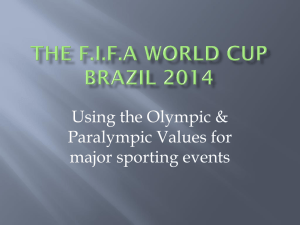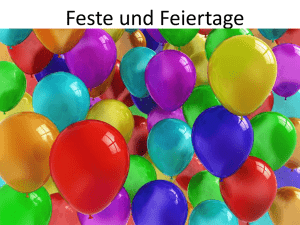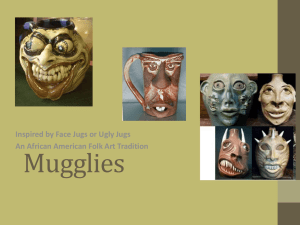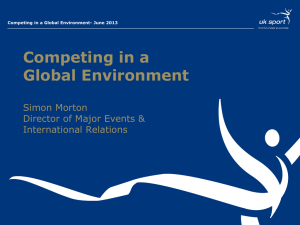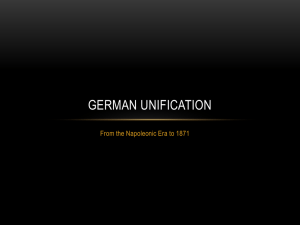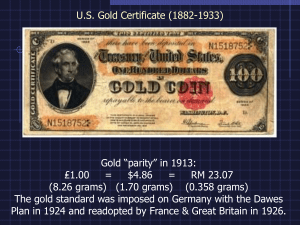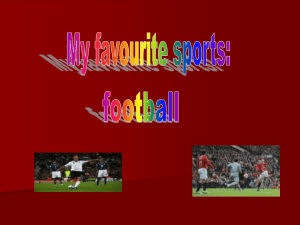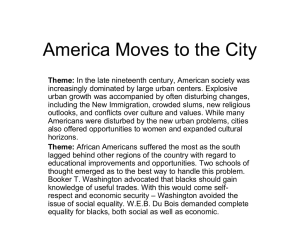The seminar presentation is available here.
advertisement
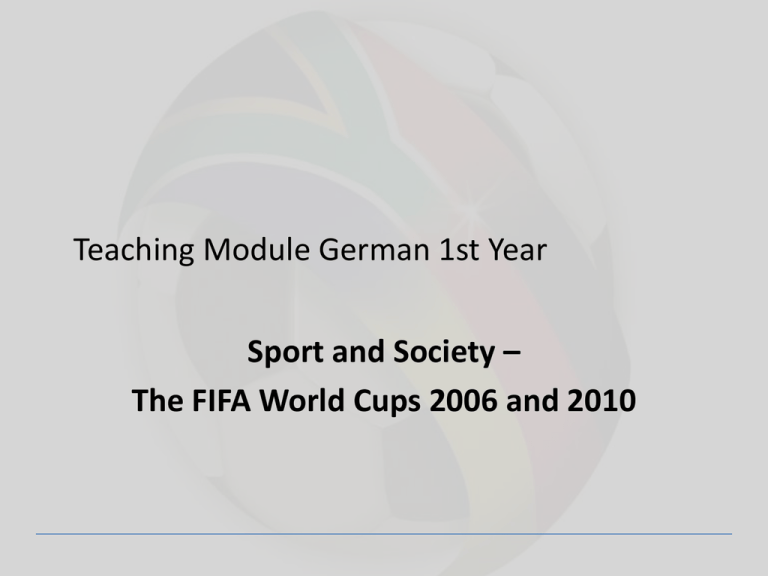
Teaching Module German 1st Year Sport and Society – The FIFA World Cups 2006 and 2010 1 „Fußball“ in Germany: Basic Facts • 6.5 mio organized members of the F.A.: 8% of the population = largest single sports association of the world • German Football Association: Deutscher Fußballbund – DFB • Organized in 27,000 clubs • High Performance Sport: 3 professional leagues (men) – Erste Bundesliga / Zweite Bundesliga / Dritte Bundesliga • Mass participation sport – Leagues down to local level – 7 organized youth group levels (G-Youth: 4-6 ... A-Youth 16-18) Dr Ralf Hermann German Studies First Year 2010: World Cup Lecture 2 1 „Fußball“ in Germany: History (1) • Imported from Britain in Germany 1873 (10 years after the founding of the British F.A.) • Rejected by movement of „Gymnastics“ – „The English disease“ - Historical and political reasons – Sport and aristocracy – Sport and values • 1875 first Football rules in German • 1875 first German club (Braunschweig); ’74 Dresden English F.C. • 1900 Founding of the „DFB“ • First German champion 1900: VfB Leipzig Dr Ralf Hermann German Studies First Year 2010: World Cup Lecture 3 1 „Fußball“ in Germany: History (2) • Alternative associations: Workers F.A. – Bourgeoise F.A. / Catholic F.A. – separate championships • National Socialism: Greater Germany league – Banning of workers association and others – Streamlining, anti-semitism, prosecution of members of banned political groups – Football and masses – DFB Nazi obedient • After WW II: separate West and East F.A. – International recognition: DFB 1950, DFV (East) 1952 • 1954 first World Cup win: „miracle of Bern“ • 1963: founding of the united „Bundesliga“ (West GER) Dr Ralf Hermann German Studies First Year 2010: World Cup Lecture 4 1 „Fußball“ in Germany: History (3) • 1970s: rise of Bayern Munich as most successful German football club • Host of World Cups 1974 and 2006 and European championship 1988 • 1974: first and only encounter of the national teams of East and West Germany Dr Ralf Hermann German Studies First Year 2010: World Cup Lecture 5 2 „Fußball“ in Germany: The National Team • First match 1908: SUI – GER 5-3 • Little success in early years • First WC appearance 1934 in Italy: Third rank • 1954: surprise winner of the WC in Switzerland – Mythologized in German historical memory: „miracle“ – Re-birth of a nation within the international community? Continuity of German superiority phantasies? • World Champion 1974 (Munich), 1990 (Rome) • WC final 1966 (London), 1982 (Madrid), 1986 (Mexico), 2002 (Tokyo) • European Champion 1996 (London) Dr Ralf Hermann German Studies First Year 2010: World Cup Lecture 6 3 World Cup Germany 1974 • Two mega-events ’72 and ’74: success of West German sport diplomacy – détente in Cold War era • ’72 Olympics: kidnapping and killing of Jewish team members by terrorists ’74 sterile high-security games • „games of friendship and fair-play“ (but no slogan) • Cold War and encounter of the 2 German teams • Germany champion, but Netherlands show modernity Dr Ralf Hermann German Studies First Year 2010: World Cup Lecture 7 3 World Cup Germany 1974 - Legacy • 40 Mio DM revenues – only 10% to FIFA • New Olympia-Stadion Munich for 1972 / 74: iconic architecture • First WC fully covered in colour TV • First participation of an African team (Zaire) – turn to global participation in the WC begins Dr Ralf Hermann German Studies First Year 2010: World Cup Lecture 8 1974 World Cup Host Cities Dr Ralf Hermann 2006 World Cup Host Cities German Studies First Year 2010: World Cup Lecture 9 3 World Cup Germany 2006 • 2000 bid – one vote ahead of South Africa • Unified Germany in a block-free world • Slogan: „Die Welt zu Gast bei Freunden“ / „A time to make friends“ Dr Ralf Hermann German Studies First Year 2010: World Cup Lecture 10 3 World Cup Germany 2006 • Nation branding and image campaigns – e.g. Walk of Ideas • Cultural fringe programme and public viewing • Street Soccer World Cup • German flags – new nationalism? Dr Ralf Hermann German Studies First Year 2010: World Cup Lecture 11 3 World Cup Germany 2006: Legacy • Modernisation of infrastructure and stadiums • Macro-economic effects controversial • Tourism: high ex-ante estimates, not realistic • Retail effects marginal • Employment effects, but rather short term (50,000 vs. 2000) • Economic counter-effects: „Crowding-out Effect“, „Carnival Effect“, „Time Switching“, „Auction“ and problematic spending priorities (Männig) Dr Ralf Hermann German Studies First Year 2010: World Cup Lecture 12 3 World Cup Germany 2006: Legacy • Significant ‚intangible effects‘ – External image – Self-perception – Culturisation of the event – Group participation Dr Ralf Hermann German Studies First Year 2010: World Cup Lecture 13 3 World Cup Germany 2006: Legacy Euro 1996 World Cup 2006 Dr Ralf Hermann German Studies First Year 2010: World Cup Lecture 14 3 World Cup Germany 2006: Legacy Dr Ralf Hermann German Studies First Year 2010: World Cup Lecture 15 3 World Cup Germany 2006: Legacy Dr Ralf Hermann German Studies First Year 2010: World Cup Lecture 16 3 World Cup Germany 2006: Legacy Dr Ralf Hermann German Studies First Year 2010: World Cup Lecture 17 3 World Cups in Germany: 2006 Legacy Dr Ralf Hermann German Studies First Year 2010: World Cup Lecture 18 3 Previous World Cups: Legacy "Je trouve artificiel de faire venir des joueurs de l'étranger et de les baptiser Equipe de France. […] On pourrait les appeler autre chose. Je n’ai jamais cru que [ces] onze messieurs représentaient la France ! " Jean-Marie Le Pen en 1996 « Black – Blanc – Bleu » - « L’Équipe multicolore ». Celebrations on the Champs Éliysées Dr Ralf Hermann German Studies First Year 2010: World Cup Lecture 19 3 Previous World Cups: Legacy Dr Ralf Hermann German Studies First Year 2010: World Cup Lecture 20 3 World Cups in Germany: 2006 Legacy Wolfgang Männig: • Short-run economic benefits are not the main aspect/ argument of (large) sport events (exception: feelgood) • Potentially positive long-run effects: novelty effect and nation´s international perception • Experience from landmark buildings: centrally located, saving infrastructure, at the Waterfront , architectually innovative and „unpractical“ • Stadia for Germany 2006 fail, but for SA 2010 meet these principles • Good chances for South Africa: less crowding-out; no couch potatoeffect; no carneval effect; more potential for improvement in international perception Dr Ralf Hermann German Studies First Year 2010: World Cup Lecture 21 4 „Fußball“ and social change „Regel: Wer mitbekommt, was sich im Fußball wann und wie verschiebt, ist über andere Gesellschaftsbereiche osmotisch informiert.“ – Klaus Theweleit, Tor zur Welt. Fußball als Realitätsmodell • • • • • e.g. Football and social participation (classes, genders) e.g. Football and social organisation (roles, leadership, team) e.g. Football and economics (professionalisation) e.g. Football and education (sport academies) e.g. Football and integration Dr Ralf Hermann German Studies First Year 2010: World Cup Lecture 22 4 „Fußball“ and social change Champions 1954 Champions 1974 Champions 1990 Toni Turek Jupp Posipal Werner Kohlmeyer Horst Eckel Werner Liebrich Karl Mai Helmut Rahn Max Morlock Ottmar Walter Fritz Walter Hans Schäfer Sepp Maier Berti Vogts Franz Beckenbauer Karl-Heinz Schwarzenbeck Paul Breitner Rainer Bonhof Uli Hoeneß Klaus Overath Jürgen Grabowski Gerd Müller Bernd Hölzenbein Bodo Illgner Klaus Augenthaler Guido Buchwald Jürgen Kohler Andy Brehme Thomas Berthold Thomas Häßler Pierre Littbarski Lothar Matthäus Rudi Völler Jürgen Klinsmann Dr Ralf Hermann German Studies First Year 2010: World Cup Lecture 23 4 „Fußball“ and Social Change - Migration Patrick Owomoyela – German-Nigerian parents, born in Hamburg DariusWosz Polish parents, born in Slask Sami Khedira – German-Tunisian parents, born in Stuttgart David Odonkor – GER-Ghanaian parents, b. in Bünde Mustafa Dogan – Turkish parents: first Turkish descendant to play for Germany 1999 Miroslav Klose – b. in Opole, Polish German minority Gerald Asamoah – Ghanaian parents, immigration 1990, citizenship 2001 Dr Ralf Hermann Lukas Mesut Özil – b. Podolski – Gelsenkirchen, b. in 3rd generation Gliwice, of Turkish GER-POL immigrants dual citizen German Studies First Year 2010: World Cup Lecture Serdar Tasci - b. Esslingen, 3rd generation of Turkish immigrants Cacau – b. in Brazil, from 2001 in Germany, 2009 citizenship 24 4 „Fußball“ and Social Change „Frauenfußball“ in Germany • Attempts in 1920 and 1955 failed: prohibited by DFB • 1970: unbanning – first local leagues • 1974: First German Champion • 1982: First national match, GER-SUI 5-1 • 1989: European Champion – first live TV broadcast; Euro titles 1991, 95, 97, 2001, 05, 09 • 1990: Women‘s Bundesliga • World Champion 2003, 2007; Host 2011 • Still amateur status and small budgets Dr Ralf Hermann German Studies First Year 2010: World Cup Lecture 25 5 „Soccer“ in South Africa • Indigenous roots of athletic practices + colonial influence • 1862 first match: British soldiers vs. civilians in CT • Popular among British decendants – Rugby + Football • Rise of black football: – Missionary school (from 1870s) – Working class clubs – industrialization and urbanization – Rugby and „Soccer“ disintegrate: 1919 first Afrikaner rugby club, Stellenbosch; football becomes black domain • First centres: Durban – 7 clubs in 1910 47 in 1935; later: Rand – migrant workers Dr Ralf Hermann German Studies First Year 2010: World Cup Lecture 26 5 „Soccer“ in South Africa • Natal Football Association 1882, Football Association of SA 1892 • South African Indian Football Association 1903 (Black and Coloured Associations 1933 and 36) • Diqualification from CAF tournaments 1957 • FIFA suspension 1961 and expulsion 1976 (Soweto) • 1991 SAFA • 1992 first international match: SA-Cam 1-0 • 1996 AFCON champion • WC participants 1998 and 2002 Dr Ralf Hermann German Studies First Year 2010: World Cup Lecture 27 Main references • Alegi, Peter: Laduma. Soccer, Politics and Society in South Africa, Durban 2004 • Eisenberg, Christiane (ed.): Fußball, soccer, calcio, Munich 1997 • Heinrich, Arthur: Der Deutsche Fußballbund. Eine politische Geschichte, Cologne 2000 • Korr, Chuck / Close, Marvin: More Than Just A Game. Soccer vs Apartheid, London 2008 • Pillay, Udesh / Tomlinson, Richard / Bass, Orli: Development and Dreams. The Urban Legacy of the 2010 Football World Cup, Cape Town 2009 • Theweleit, Klaus: Tor zur Welt. Fußball als Realitätsmodell, Cologne 2004 Dr Ralf Hermann German Studies First Year 2010: World Cup Lecture 28
